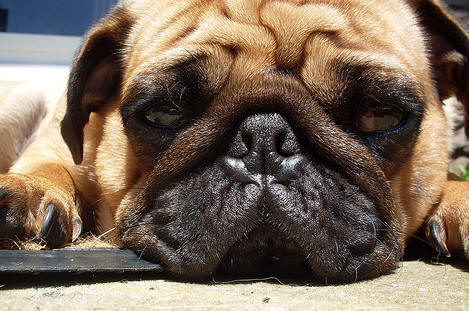Weight Control in Dogs and Cats
by Dr. Rachel Addleman, DVM, DiplABVP, CVA
Veterinarian and Certified Veterinary Acupuncturist, Dr. Addleman has advanced training and Board Certification in
feline medicine. She practices in Houston, Texas and can be found at
AnimalFixer.com
 I
watched my patient, an overweight pug, waddle past three shelves of diet
chow on his way out of the clinic. I couldn’t help but notice how content
he seemed with his giggling fat. To be fair to the pug, he did lose a pound
since the previous visit. But that was only after gaining two pounds the
year before. With each pound his snorting gets louder and his eyebrows
cloak his vision.
I
watched my patient, an overweight pug, waddle past three shelves of diet
chow on his way out of the clinic. I couldn’t help but notice how content
he seemed with his giggling fat. To be fair to the pug, he did lose a pound
since the previous visit. But that was only after gaining two pounds the
year before. With each pound his snorting gets louder and his eyebrows
cloak his vision.
I was reminded of this pug when I saw a girl at Macy’s last weekend eyeing
her tush in the mirror. It was rather large and round, and she had a layer
of back handles that giggled just like that pug. She, too, waddled out and
paraded her new outfit to her friend exclaiming, “Yeah baby, I look good!”
Beauty, along with ideal weight, is definitely in the eye of the beholder.
This is why it is difficult to explain to a loving pet owner that their
precious Labrador looks like a beached whale. Weighing in at one hundred
pounds doesn’t mean your machismo dog is “a giant breed” or “the biggest in
his litter”. Nine times out of ten, it means he’s plain ol’ fat.
To get your dog to lose weight, try cutting out snacks and feeding a
smaller portion. It’s a simple strategy and especially hard when dogs use
their super powers to implore you to feed them. Remember: just because a
dog pants, passes gas, or gets up off his bed to sniff you, doesn’t mean he
needs more food.
Your veterinarian can make diet recommendations to prevent obesity, which
is a major cause of illness in pets. Obesity makes arthritis worse, can
cause back problems, and can lead to an early death. Yet it seems
veterinary recommendations are no match for the latest internet advice that
clients often spend hours searching for. You have your choice of holistic,
natural, gluten-free, grain-free, freeze-dried, low calorie, high protein,
raw, free range, and of course, organic foods. Any of which are far better
than I myself eat.
I have a few patchouli smelling, Birkenstock wearing, vegan cat owners.
They ask me if it’s OK if their cats are vegetarian as their Marlboro packs
hang out of their hemp bags. Cats are true carnivores, I remind them. They
are meat eaters. They are unable to digest carbohydrates in foods like dogs
and people can. High carbohydrate diets can lead to obesity and diabetes.
A healthy cat should be eating a diet similar to his wild cousins – a mouse
for instance, is high in protein, high in fat, and very low in
carbohydrates. Most dry cat foods have a high carbohydrate level due to the
grain that is required to form the product.
Canned food, with its low carbohydrates and high water content, is ideal
for most cats. There are a few other options to ask your vet about, as some
cats won’t eat canned food, like my Alvinanne. She could eat anything and
look good, she is the supermodel of cats. Other cats look at her and feel
jealous that she eats dry food, hardly goes to the gym, and still keeps her
rock star figure.
The biggest resistance to feeding a cat canned food is not the expense or
the hassle it is to prepare. Its what canned food smells like at the other
end. But, I tell everyone, at least it’s a natural and organic smell. Just
look it up on the internet.
Dr. Addleman’s other cat, Amos, is a scale topping 26 pounds. He eats
only the best canned foods and when it comes out, it smells very natural
and organic.
